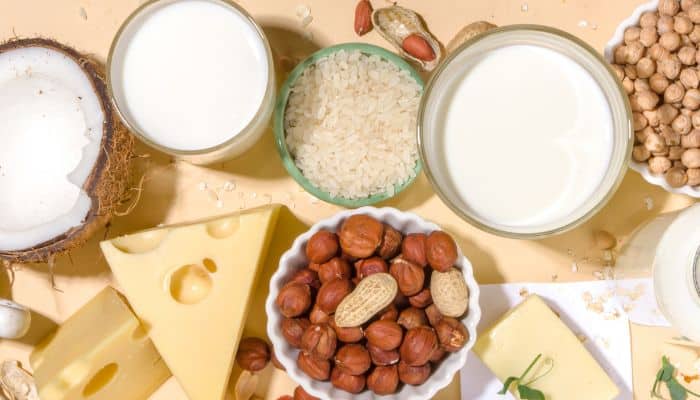Millennials, currently the largest generation group in the U.S., are making an environmental and lifestyle impact by choosing and consuming plant-based milk alternatives over the traditional option. Find out the top reasons this part of the population is leaning toward this change.
Lactose Intolerance and Allergies
Roughly 30 million American adults develop some degree of intolerance to lactose by age 20. These young people often switch to plant-based alternatives to enjoy milk without experiencing bloating, diarrhea, nausea and other worrying symptoms.
Intolerance to animal-produced milk happens when the body can’t produce an enzyme called lactase. It breaks down lactose, a form of sugar in milk and milk products, so that the blood can absorb it. If the small intestine can’t make enough lactase, intolerance occurs.
Some people also have lactose or dairy allergy, a food allergy prevalent in children that can also occur in adults. Anaphylactic shock is a life-threatening symptom of people who have an adverse reaction to dairy.
Some millennials turn to plant-based milk mainly because their bodies respond to lactose adversely. Those who want to enjoy their coffee with milk but want to avoid unpleasant symptoms turn to plant-based substitutes, such as soy or oat milk.
Shift to a Healthier Lifestyle
The plant-based beverage industry is growing — it’s expected to reach $29.6 billion by the end of 2023 — so there’s clearly a demand for a healthier lifestyle.
When it comes to nutrient profiles, milk made of plants fares equally with cow’s milk minus the hormones, making them great alternatives. Vegan milk substitutes are naturally low in fat and calories — people trying to lose weight may opt for these choices. Many are also enriched with proteins, calcium, vitamin D and potassium.
Experts chose soy milk as the best plant-based milk substitute because it’s rich in protein and has isoflavones, compounds that help fight cancer — a benefit that other plant options don’t have. Many millennials are conscious about leading a healthy lifestyle, so alternatives to conventional products are always welcome. They opt for natural and eco-friendly everyday commodities, from clothing to personal care and now their foods.
Concern for Animal Welfare
Animal welfare has always been a popular subject, online and offline. Dairy farming is at the center of this whirlwind of controversies. On the grocery shelves, milk products show cows happily wandering around a grassy hillside — but this is far from the truth.
Female cows are continuously impregnated every year to sustain the massive demand for milk. Hours or days after being birth, calves are taken away from mother cows. Female babies suffer the same fate as their mothers, while male babies are starved or sold.
The increasing awareness of animal welfare in dairy farms has compelled many millennials to remove dairy milk from their grocery list and replace them with cruelty-free products. Among generations, millennials are more involved with movements related to the environment, and this shows in the changes in their personal choices.
Reduce Greenhouse Gas and Carbon Footprint
Among ruminant animals, cattle release the most methane. One cow belches roughly 220 pounds of potent greenhouse gas every year, which affects the environment’s temperature. Livestock is one of the sectors that contribute to the most methane due to this.
Methane is produced as a result of a natural digestive process called enteric fermentation in animals like cows, goats and sheep as they digest grasses and plants. Animals release this gas through burps and manures.
Diverting to a plant-based source for milk is a way for many millennials to curb greenhouse gasses and individual carbon footprint. These people are more informed about environmental issues, thanks to the internet. Now, they can think carefully about whether the products they buy have a bad effect on the environment. With a growing interest in green initiatives, simple diet alterations can empower them to make a difference in little ways.
Variety of Consistencies and Flavors
Younger people also choose plant-based milk due to its variety of flavors and consistencies. Compared to traditional milk, with choices limited to full cream, low fat and skim, vegan milk can have nutty, beany and sweet flavors. Their consistencies also vary from watery to creamy.
There are 17 types of dairy-free milk that cater to every millennial’s unique taste. Each has a distinct flavor, consistency and ideal use. For instance, coconut milk is great for cooking. You can use soy milk with coffee and almond milk for baking. Young people love exploring the variations and taste dairy-free milk has.
Why Switch to Plant-Based Milk Alternatives
Vegan milk is now a staple in coffee shops, restaurants and American homes. It’s not just a passing trend. It’s turning into a lifestyle. More people shift to this option for health, environmental and personal reasons.
This sector is expected to grow as the appeal of a healthy lifestyle spreads beyond millennials and attracts older adults and even younger generations. The various benefits of plant-based milk sources are more than enough to encourage you to rethink your diet choices.
Writer Bio

Beth is the Managing Editor and content manager at Body+Mind. She shares knowledge on a variety of topics related to nutrition, healthy living, and anything food-related. In her spare time, Beth enjoys trying out new fitness trends and recipes.




